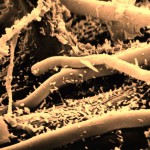Bacteria: Friends or Foes?
 As I’ve gotten older, I’ve noticed a trend in society that I find both unnecessary and disturbing: The fear of germs. People have become so afraid of bacteria, it’s evident that they don’t have a thorough understanding of the vital role bacteria play in ecology.
As I’ve gotten older, I’ve noticed a trend in society that I find both unnecessary and disturbing: The fear of germs. People have become so afraid of bacteria, it’s evident that they don’t have a thorough understanding of the vital role bacteria play in ecology.
Bacteria are vital to life itself. To illustrate this concept, it’s worth noting that our intestinal tract is home to trillions of bacteria. These bacteria are largely responsible for the digestion and, therefore, bio-availability of the foods and nutrients we ingest. Humans tend to think that digestion happens in our stomach by way of bile, but that’s mostly a precursor to the real work. We are only able to absorb nutrients, vitamins, proteins, etc. thanks to the work our gut flora do for us. What we eat, they eat. And what we can’t use in its raw form, they prepare for us. Our gut flora are the chefs of our intestinal tract.
Another way bacteria help us is in training our immune system to recognize threats. The vast majority of germs are of no risk to humans whatsoever, as long as the immune system is functioning correctly and the body is in good health. One of the ways we train our immune systems is by getting dirty. It might be tempting to say that “cleanliness is next to godliness”, but it’s more realistic to say, “dirtiness leads to healthiness”.
Children, especially babies, train their immune systems by way of experiencing dirt. Lots and lots and lots of dirt. Soil is, by definition, decomposed organic matter mixed with broken-down rock and sand. Soil, therefore, is replete with a vast population of living bacteria. Babies begin training their immune systems to recognize non-harmful, “friendly” bacteria by way of their tendency to put nearly everything they can get their hands on into their mouths.
This exposure to a plethora of non-harmful microorganisms teaches the immune system to recognize the non-harmful relationship between the body and the organisms. In recognizing the organisms to be of no risk whatsoever, the immune system learns to tailor its responses and act appropriately to risk. A well-tuned immune system only responds to real threats.
Kids playing in the sandbox, rolling on the ground, falling down and getting a mouthful of dirt, and babies putting all manner of stuff in their mouths all contribute to training the immune response to act only on threats. It also serves to help populate the gut with an abundance of “good” bacteria. A healthy population of gut flora features roughly 1,000 trillion microorganisms! There’s a number that’s tough to imagine, isn’t it!
While it’s true that some bacteria are not friendly toward humans and, in fact, can be dangerous to our health and well-being, the vast majority of bacteria are harmless or beneficial to us. It’s by far in our best interest to relax and not worry about germs. For the most part, germs only make us sick when our overall health is much less than optimal and our immune systems are lacking the “practice” of recognizing good versus bad bacteria.
The best practice, therefore, is to enjoy a lifestyle that doesn’t worry about a little dirt. If your kids are outside rolling around in the dirt, be happy in the knowledge that they’re doing what kids instinctively know to do: They’re making sure their immune systems are exposed to the largest array of healthful and harmless bacteria possible, and in so doing, these kids are helping to ensure their immune systems respond appropriately.
It’s common to see antibacterial soaps, sprays and lotions available in public places. My personal thoughts are that while well-intentioned, they actually do more harm than good. Antimicrobial soaps potentially cause antibiotic-resistant bacterial strains. This happens because hand-washing is typically ineffective in killing germs in the first place (despite common “knowledge” to the contrary). As germs are exposed to non-lethal antimicrobials, they develop resistance.
As a secondary issue, excessive hand-washing carries a very real risk of developing dermatitis. Soap dries out the skin, causing cracking and fissures that actually expose us more to the risk of infection from unfriendly bacteria. Our skin is our first defence against environmental pollutants and exposure to unfriendly bacteria. As such, it’s in our best interest to take the best care of it as we possibly can.
While we generally do most of our immune-system training in our childhood years, it’s never too late to help whip our system into shape. The first step is to relax and trust your immune system to always do the right thing and respond appropriately to threats. The second step is to let yourself get dirty and not freak out about it.
After all, that which does not kill you makes you stronger.



February 28, 2011 at 6:58 pm
lynpeel
I thought this might contribute to your article:
http://www.the-scientist.com/blog/display/57272/
Gut bacteria are what we eat – The Scientist – Magazine of the Life Sciences
http://www.the-scientist.com
Lyn
February 28, 2011 at 8:20 pm
Trane Francks
Thanks for the excellent link, Lyn! The information is a most welcome addition. Interestingly, the idea of horizontal gene transfer is precisely one of the reasons why GMO foods are so incredibly dangerous for us to eat: GMO foods can do nasty things such as pass on the Roundup-Ready gene into our gut flora with the result being that our supposedly beneficial gut flora are now producing pesticides directly within our intestinal tract.
Great info. Thanks. 🙂